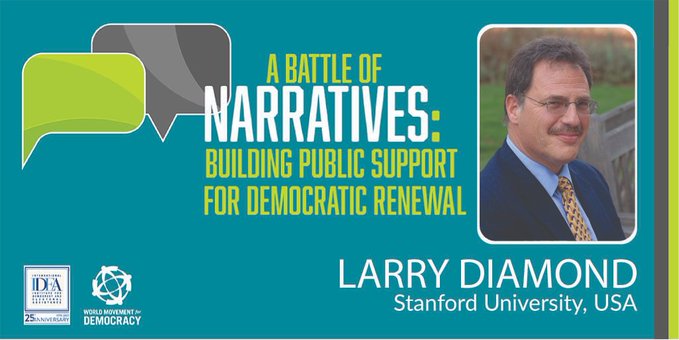 A “long twilight struggle” between democracy and communism required Americans to bear fresh burdens, John F. Kennedy said in his 1961 inauguration speech. Two years later, Hannah Arendt stated in her book, On Revolution:
A “long twilight struggle” between democracy and communism required Americans to bear fresh burdens, John F. Kennedy said in his 1961 inauguration speech. Two years later, Hannah Arendt stated in her book, On Revolution:
No cause is left but the most ancient of all, the one, in fact, that from the beginning of our history has determined the very existence of politics, the cause of freedom vs. tyranny.
That is what the war in Ukraine, the war FOR Ukraine, is about, according to Stanford University’s Larry Diamond: not about Ukraine someday joining NATO, but about Ukraine — a country so important to Russia’s cultural heritage and historical self-conception — becoming a free country, a functioning liberal democracy, and thus a negation of and an insult to everything that Vladimir Putin and his kleptocratic Kremlin oligarchy cynically represent.
Could Russia’s criminal, blundering invasion of Ukraine launch a new wave of democratic progress and a liberal and anti-authoritarian zeitgeist? It could, but it will require the following things, adds Diamond, Mosbacher Senior Fellow in Global Democracy at the Hoover Institution’s Freeman Spogli Institute for International Studies:
 First, Russia must fail in its bid to conquer and extinguish Ukraine. The United States and NATO must do everything possible, and much more than we are doing now, to arm and assist Ukraine militarily, and to punish Russia financially and economically.
First, Russia must fail in its bid to conquer and extinguish Ukraine. The United States and NATO must do everything possible, and much more than we are doing now, to arm and assist Ukraine militarily, and to punish Russia financially and economically.- Second, we must wage a more effective and comprehensive battle of information and ideas to expose Russia’s mendacity and criminality and to document its war crimes… We need an intense campaign of technological innovation to circumvent authoritarian censorship and empower Russian, Chinese, and other sources that are trying to report the truth …. In general, we need to promote democratic narratives and values much more imaginatively and resourcefully. …..
- Third, we must ensure that we perform more effectively as democracies, and with greater coordination among democracies, to meet the challenges of developing and harnessing new technologies, creating new jobs, and reducing social and economic inequalities.
- Fourth, to win the technological race, for example in semiconductors, artificial intelligence, biomedicine, and many other fields of science, engineering, and production, we must open our doors more widely to the best talent from all over, including China. …
- Finally, we have to reform and defend our democracy in the United States so that it can function effectively to address our major domestic and international challenges, and so that American democracy can once again be seen as a model worth emulating.
As of February 24, we have entered a new historic era, adds Diamond, the founding coeditor of the Journal of Democracy and co-chair of the Research Council of the International Forum for Democratic Studies of the National Endowment for Democracy (NED). RTWT








